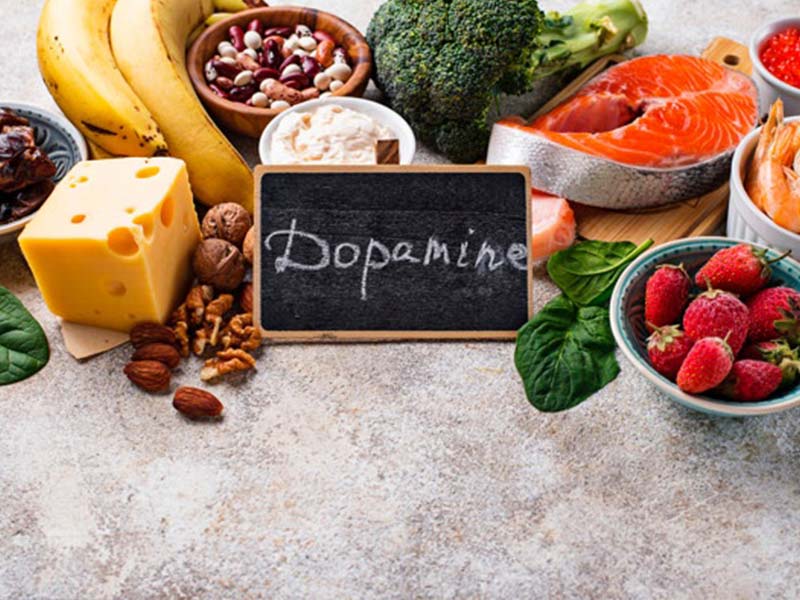
Just imagine a scenario- stuck inside your home out of fear of the virus, you start feeling blue. You head to the fridge and help yourself to some chocolate. And wollah! You slowly feel all that sadness, worry and lull quickly melting away. Each one of us has experienced such a scenario when food helped us to beat the blues. This is because certain foods cause the release of dopamine, the body’s happy hormone.
Table of Content:-
Now, what if we tell you that there is a diet that helps you shed those extra kilos while keeping you happy. You probably experienced the release of even more dopamine in your brain, right? Dopamine diet is based on that. Michelin-starred chef Tom Kerridge, who popularised this diet, claimed that he lost tons of weight by being on this diet. It is often also referred to as the Tom Kerridge diet. Before we dig deeper into this diet, let’s understand a bit more about dopamine, Public Health Expert and Nutritionist Swati Bathwal.
What Is Dopamine?
A neurotransmitter, dopamine is responsible for transmitting signals across the brain. It has many functions, including regarding movement, memory and sleep regulation. It is the primary driver of the brain’s reward system. So that feeling of accomplishment after getting praised at work or getting that thumb’s up on social media is the work of dopamine. And when you feel demotivated and lack enthusiasm, it means your dopamine level has crashed.
Also Read: What Is Dopamine Detox? Benefits and How to Try It, Expert Tells
What Is Dopamine Diet?
We know how draining, dull and sometimes depressing weight loss diets can be. Having to refrain from having foods that make us happy is a huge challenge. The dopamine diet works on the opposite principle. In this, you basically eat foods that trigger the release of the ‘happy hormone’ dopamine in your brain. However, some suggest eliminating alcohol and caffeine from the diet, while others suggest cutting back on starchy carbohydrates, which is found in foods such as rice, potato, oats, bread and pasta.
What Foods Can You Eat When On A Dopamine Diet?
Foods that trigger dopamine release in your brain include:
- Protein: When on this diet, it is recommended to load on proteins. This is because this macronutrient is formed of amino acids including tyrosine, which is crucial for the production of dopamine. Also, protein makes you feel full, thus controlling your appetite. It’s good if you have a protein-rich breakfast as it will help prevent those mid-morning cravings.
- Dairy: Milk, paneer, cheese, curd, etc.
- Eggs
- Fruits and vegetables, especially bananas
- Nuts such as almond and walnut
- Omega 3 fatty acid-rich fishes such as salmon, sardine and cod.
- Unprocessed meats
Also read: Dopamine Fasting: Is This Trending Wellness Craze Worth the Hype?
Pros And Cons Of Dopamine Diet
Although research in this area is limited, dopamine in your food will leave you happy and satisfied. It will be especially crucial when you feel sad and unmotivated. Regarding its cons, doing away with starchy carbs that many on this diet recommend might not be that beneficial, although there isn’t enough research. Carbohydrate is a macronutrient that is crucial for survival and you need to have some amounts in your meals for a healthy body and sane mind.
Now coming back to weight loss diets, these are often fads that appear and disappear in no time. Also, social media are filled with celebs and fitness enthusiasts claiming the benefits of the latest diets they are on. On your quest to lose weight, this can be confusing and overwhelming. But it is for you to decide what works for your body and what does not. If your body hates diet of any kind, so be it. Just have a nutritious and well-balanced diet and have an active lifestyle. Not only is it sustainable, but it’ll also surely show a drop on that weighing scale.
On a concluding note, Swati Bathwal adds, "If you eat fresh, cook fresh, you reduce obesogenic triggers i.e. you eliminate triggers like plastics, pesticides, food colours, aluminium and preservatives which contributes to weight gain. Do not go for any diet fads, follow. a plan which is customised to your needs because weight loss is difficult and weight maintenance is the toughest."
Also watch this video
FAQ
How to increase dopamine to lose weight?
Eating a healthy diet is essential for increasing dopamine production. You should add high protein foods like eggs, legumes, soy, meat and low-fat dairy.Which food has the highest dopamine?
Foods that are high in amino acid tyrosine produce the highest dopamine. These include eggs, lean meat, fish, legumes, low-fat dairy, nuts and seeds.What are signs of low dopamine?
Signs and symptoms that indicate low dopamine are tiredness, anxiety, frequent mood swings, feeling hopeless or depressed, disturbed sleep patterns, to name a few.
How we keep this article up to date:
We work with experts and keep a close eye on the latest in health and wellness. Whenever there is a new research or helpful information, we update our articles with accurate and useful advice.
Current Version
Aug 25, 2021 00:00 IST
Published By : Chanchal Sengar
